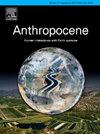Uncovering the co-evolution of land use change and ecosystem services in Shandong of China
IF 3.9
2区 地球科学
Q2 ENVIRONMENTAL SCIENCES
引用次数: 0
Abstract
Many studies have explored the relationships between ecosystem services (ES) and land use/ land cover (LULC) changes but understanding the synergistic evolution of their complex socio-ecological dynamics is still limited in China. This study provides a comprehensive time-series analysis of ES and LULC spanning 1950–2022 in Shandong of China, offering valuable insights into the sustainability of social-ecological systems. We derived evolutionary trends by analysing satellite map data, official government data, and literature data; developing a conceptual model of causal feedback of LULC and ES by the Granger causality test; analysed the relationships of ES with LULC and GDP using the Environmental Kuznets Curve (EKC) model and sequential principal component analysis. The trend analysis reveals that urban sprawl is increasingly encroaching on most of the natural land, especially agricultural land, posing a serious threat to food security. The EKC modelling demonstrates that economic growth continues to fuel urban expansion without reaching a tipping point. Our conceptual model suggests that urbanization increases the demand for provisioning services, deteriorating key regulating services, in a synergistic relationship with tourism. Wetland loss further exacerbates annual precipitation decline, triggering negative feedback with temperature and drought, leading to the degradation of shrubs and grasslands. Ultimately, these factors collectively undermine regional ecosystem resilience. Our results suggest that the socio-ecological systems in Shandong experienced weakening connectivity and heightened vulnerability between 1980 and 2022, indicating a shift toward functional disturbance and possible reorganization, with the possibility of approaching tipping point. Our findings provide valuable insights for policymakers in China and other global mountains for land management and ecosystem restoration to avoid the collapse of social-ecological systems.
山东省土地利用变化与生态系统服务的协同演化
许多研究已经探讨了生态系统服务(ES)与土地利用/土地覆盖(LULC)变化之间的关系,但对两者复杂的社会生态动态的协同演化的理解仍然有限。本研究对山东省1950-2022年的ES和LULC进行了全面的时间序列分析,为社会生态系统的可持续性提供了有价值的见解。我们通过分析卫星地图数据、官方政府数据和文献数据得出进化趋势;通过格兰杰因果检验建立了LULC和ES因果反馈的概念模型;利用环境库兹涅茨曲线(EKC)模型和序贯主成分分析,分析了ES与LULC和GDP的关系。趋势分析表明,城市扩张日益侵占大部分自然用地,特别是农业用地,对粮食安全构成严重威胁。EKC模型表明,经济增长继续推动城市扩张,但没有达到临界点。我们的概念模型表明,城市化增加了对提供服务的需求,在与旅游业的协同关系中恶化了关键的调节服务。湿地的丧失进一步加剧了年降水量的减少,与温度和干旱产生负反馈,导致灌木和草地退化。最终,这些因素共同破坏了区域生态系统的恢复能力。研究结果表明,1980 - 2022年,山东省社会生态系统的连通性减弱,脆弱性增加,预示着功能紊乱和重组的转变,并有可能接近临界点。研究结果为中国和全球其他山区的决策者提供了宝贵的土地管理和生态系统恢复建议,以避免社会生态系统的崩溃。
本文章由计算机程序翻译,如有差异,请以英文原文为准。
求助全文
约1分钟内获得全文
求助全文
来源期刊

Anthropocene
Earth and Planetary Sciences-Earth and Planetary Sciences (miscellaneous)
CiteScore
6.30
自引率
0.00%
发文量
27
审稿时长
102 days
期刊介绍:
Anthropocene is an interdisciplinary journal that publishes peer-reviewed works addressing the nature, scale, and extent of interactions that people have with Earth processes and systems. The scope of the journal includes the significance of human activities in altering Earth’s landscapes, oceans, the atmosphere, cryosphere, and ecosystems over a range of time and space scales - from global phenomena over geologic eras to single isolated events - including the linkages, couplings, and feedbacks among physical, chemical, and biological components of Earth systems. The journal also addresses how such alterations can have profound effects on, and implications for, human society. As the scale and pace of human interactions with Earth systems have intensified in recent decades, understanding human-induced alterations in the past and present is critical to our ability to anticipate, mitigate, and adapt to changes in the future. The journal aims to provide a venue to focus research findings, discussions, and debates toward advancing predictive understanding of human interactions with Earth systems - one of the grand challenges of our time.
 求助内容:
求助内容: 应助结果提醒方式:
应助结果提醒方式:


